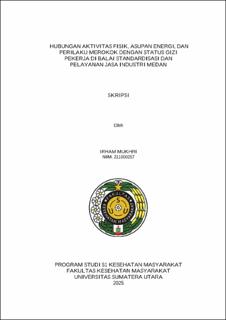| dc.contributor.advisor | Salmah, Umi | |
| dc.contributor.author | Mukhri, Irham | |
| dc.date.accessioned | 2025-06-23T04:35:56Z | |
| dc.date.available | 2025-06-23T04:35:56Z | |
| dc.date.issued | 2025 | |
| dc.identifier.uri | https://repositori.usu.ac.id/handle/123456789/104524 | |
| dc.description.abstract | Occupational safety and health (OSH) aim to reduce and prevent workplace accidents and occupational diseases in order to enhance productivity and work efficiency. One of the key aspects of OSH implementation is occupational health, which is related to nutritional status. A worker who has good nutritional status will have better endurance and ability to accept work. Poor nutritional status in workers can cause decreased nervous sensitivity, feelings of lethargy, and fatigue more quickly, and they are more susceptible to experience pressure and possess an increased likelihood of non-communicable diseases (NCDs). This condition directly impacts reducing work productivity and can affect work efficiency and worker safety while working. This study aims to analyze the relationship between physical activity, energy intake, and smoking behavior with the nutritional status of workers in Medan Industrial Standardization and Service Center (BSPJI). This research method is analytical quantitative research with a cross-sectional approach. The sampling technique used simple random sampling with a sample size of 43 workers. Nutritional status data were collected using body scales and a microtoise, energy intake data using the 24-hour food recall method, smoking behavior data using questionnaires, and physical activity data using the IPAQ Short-Form questionnaire. The Chi-Square statistical test was used to analyze the data. The research findings indicate that 55.8% of workers suffer from poor nutritional status, 48.8% engage in light physical activity, 72.1% have inadequate energy intake, and 51.2% are non-smokers. The results also reveal a significant relationship between physical activity and energy intake with nutritional status, but no association was found between smoking behavior with workers' nutritional status. Efforts are required from BSPJI Medan to implement a weekly exercise or gymnastics program at the office and to organize socialization regarding healthy eating habits for the workers. | en_US |
| dc.language.iso | id | en_US |
| dc.publisher | Universitas Sumatera Utara | en_US |
| dc.subject | Worker | en_US |
| dc.subject | BSPJI | en_US |
| dc.subject | Nutritional Status | en_US |
| dc.title | Hubungan Aktivitas Fisik, Asupan Energi, dan Perilaku Merokok dengan Status Gizi Pekerja di Balai Standardisasi dan Pelayanan Jasa Industri Medan | en_US |
| dc.title.alternative | The Relationship of Physical Activity, Energy Intake, and Smoking Behavior with Workers Nutrition Status at Medan Industrial Standardization and Service Center | en_US |
| dc.type | Thesis | en_US |
| dc.identifier.nim | NIM211000257 | |
| dc.identifier.nidn | NIDN0023057308 | |
| dc.identifier.kodeprodi | KODEPRODI13201#Kesehatan Masyarakat | |
| dc.description.pages | 98 Pages | en_US |
| dc.description.type | Skripsi Sarjana | en_US |
| dc.subject.sdgs | SDGs 3. Good Health And Well Being | en_US |


